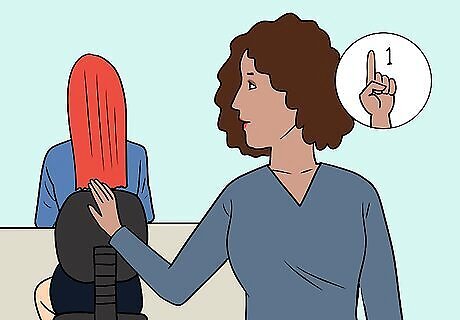
views
Figuring Out the Cause

Consider what else is happening in their life. It could be that they're not actually giving you the cold shoulder. Maybe they, or someone they care about, is ill or having personal problems. You won't know for sure until you ask them, but if you notice they seem more withdrawn with other people, too, it might not be the cold shoulder at all. If you notice a really severe personality change and other mutual friends do, too, talk to the person immediately. They could be in a position where they really need help. Keep in mind that they might not even be aware they're giving you the silent treatment. People can withdraw from others for a variety of reasons without realizing it.

Determine if this is a pattern. If this isn't the first time they have given you the cold shoulder, ask yourself a few questions. Have they treated you this way before? Was it in response to something you said or did that they didn't like? If so, you might be in a manipulative or controlling relationship. If you are in a manipulative, controlling, or abusive relationship, you might want to see a therapist to discuss the relationship and your place in it. It can also help to share your concerns about your relationship with a trusted friend or family member, who can support you during a difficult time.

Practice what you'll say. You want to feel like you said what you needed to say, so plan it ahead of time. It's easy to get nervous or defensive, or to come off the wrong way if you aren't prepared. Close your eyes and imagine you're alone with this person and say out loud what you want to say.
Confronting the Person

Ask to speak in private. If you talk to them in a public place, it's easier for them to change the subject or for the two of you to get interrupted. Instead, ask if you can talk to them somewhere private – maybe an out-of-the-way bench in a park or even a quiet corner of a coffee shop. If you live with the person, ask if you can speak to them somewhere where you'll both be comfortable – like the living room sofa. If they refuse to meet or talk with you, that's a pretty good indication that they're using the silent treatment to manipulate or control you. It's okay at that point to tell them you understand they don't want to talk, and that you'll be walking away from the relationship.

Say that you value the relationship. It's important to start here so they know that you're not just trying to start a fight. It starts the conversation by letting them know that you care about them and the relationship and that their behavior has mattered to you. For example, you can say things like, "I've really enjoyed spending time/working with you," or "I'm hoping you can help me figure out what's happening between us, because I appreciate your friendship so much." Ask if you've done something to upset them and let them know you want to make the situation right.

Express how their silence makes you feel. This is especially important if you're very close to the person who's giving you the silent treatment. Let them know how it makes you feel, whether that's sad or hurt. But because the silent treatment is often used by people trying to control others, make sure you remain calm and collected as you explain your feelings. You can say something like “Sally, I really love you and I value our friendship, but I feel hurt when you shut me out. I hope we can talk about this and sort it out."

Pay attention to your tone. Most people who use the silent treatment on a regular basis do it to get a reaction. If you sound overly hurt or sad, or even desperate to get their friendship back, it gives them incentive to keep using the silent treatment. Instead, do your best to sound calm and in control. For example, instead of saying, “I'm really hurt and I've been losing sleep over it and I'll do anything to get out friendship back,” you can say something like “I feel hurt and sad when you won't talk to me. If you'd like to talk, I'm happy to talk, too.”

Listen to what they have to say. This is important whether there is a real reason they're using the silent treatment or if they're doing it to control you. Give them a chance to explain why or how you hurt them (if that's the cause). If they don't seem able to come up with a good answer, that's a good indication that they're manipulating you. For example, if they say something like, “A few weeks ago, we were talking about my job and you said something that really hurt my feelings. I wasn't sure how to deal with it so I've been speaking to you less,” then you have something concrete you can address and apologize for. If, however, they say something like “I asked you to go to dinner with me but you said no because you had to go to your aunt's funeral,” then it's likely they're manipulating you into putting them before anyone and anything else. If they just ignore you or completely change the subject instead of answering your question, they're also likely manipulating you, and it's okay to simply walk away.
Moving Forward

Improve your communication skills. Better communication skills can help avoid a repeat of the silent treatment if it turns out that a miscommunication caused it in the first place. There are a few simple things you can do to improve your communication skills. Stop and listen to what your friends are saying in a conversation, rather than rushing in to say what you want. Be honest in your conversations. If you don't want to do something, say so. If something bothers you, tell them about it. Pay attention to what they don't say. You can figure out a lot about how a person is feeling by their body language. If they don't make eye contact, seem distracted, or stand with their hands folded, they are likely upset.

Try only once. If it seems apparent that they are using the silent treatment to control or manipulate you, don't try again and again to fix things between you. After you have confronted the person who is giving you the silent treatment, you have done everything you can. Now, it is up to the other person to step up and begin communicating with you. If they don't, stop trying to talk to them about it. Instead, live your life as normally as possible.

Be willing to walk away. The silent treatment indicates that either they don't want to talk to you or they're trying to control you. In both cases, it's probably best to walk away from the relationship. If the person giving you the silent treatment is someone you work with, you probably can't just walk away. Instead, only interact with that person when it's absolutely necessary. Remain professional and calm, but don't go above and beyond in any way in your interactions with them.




















Comments
0 comment